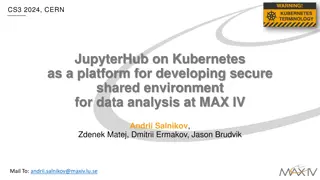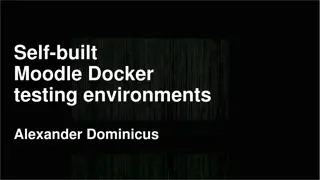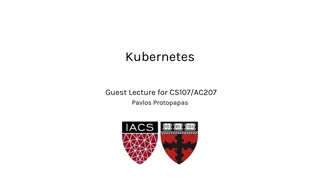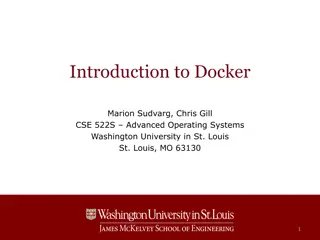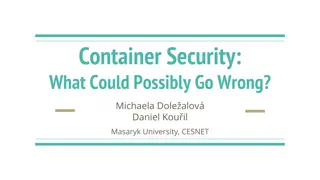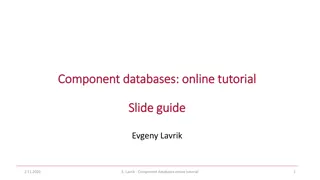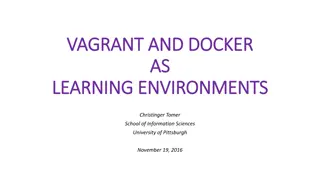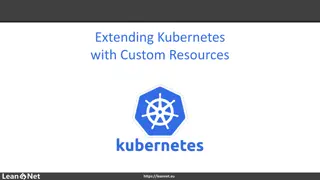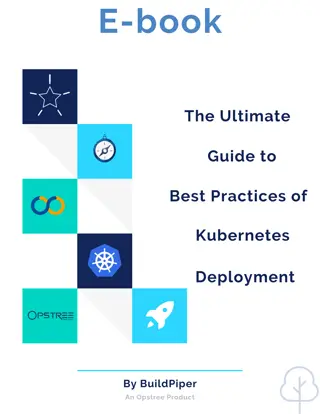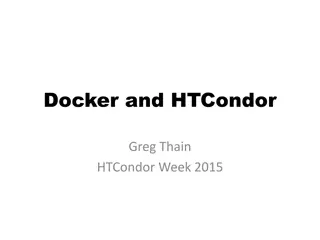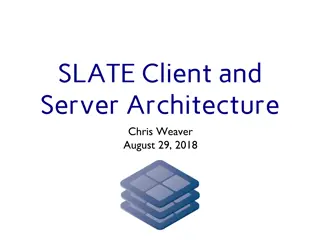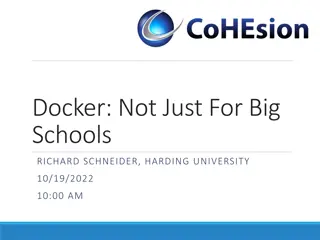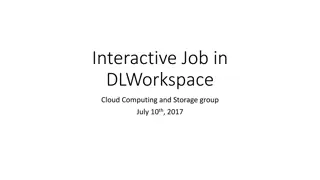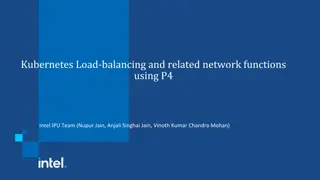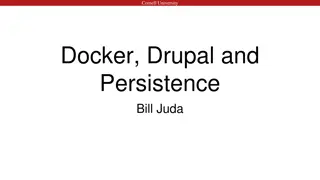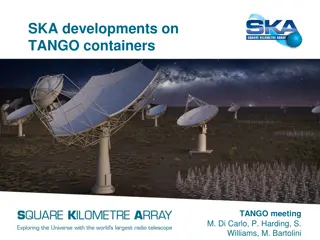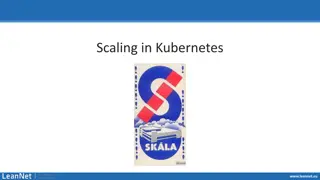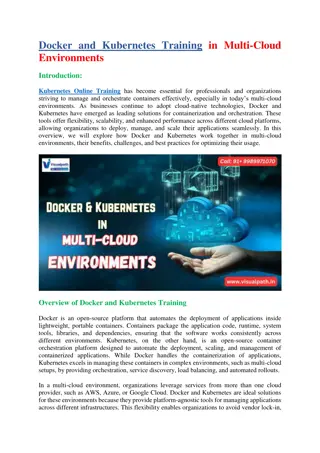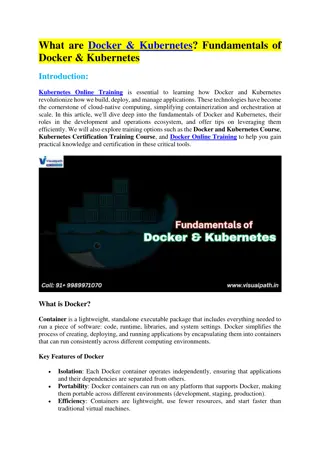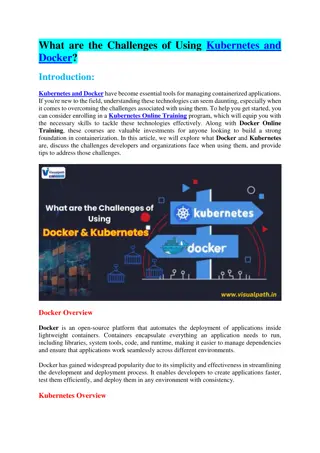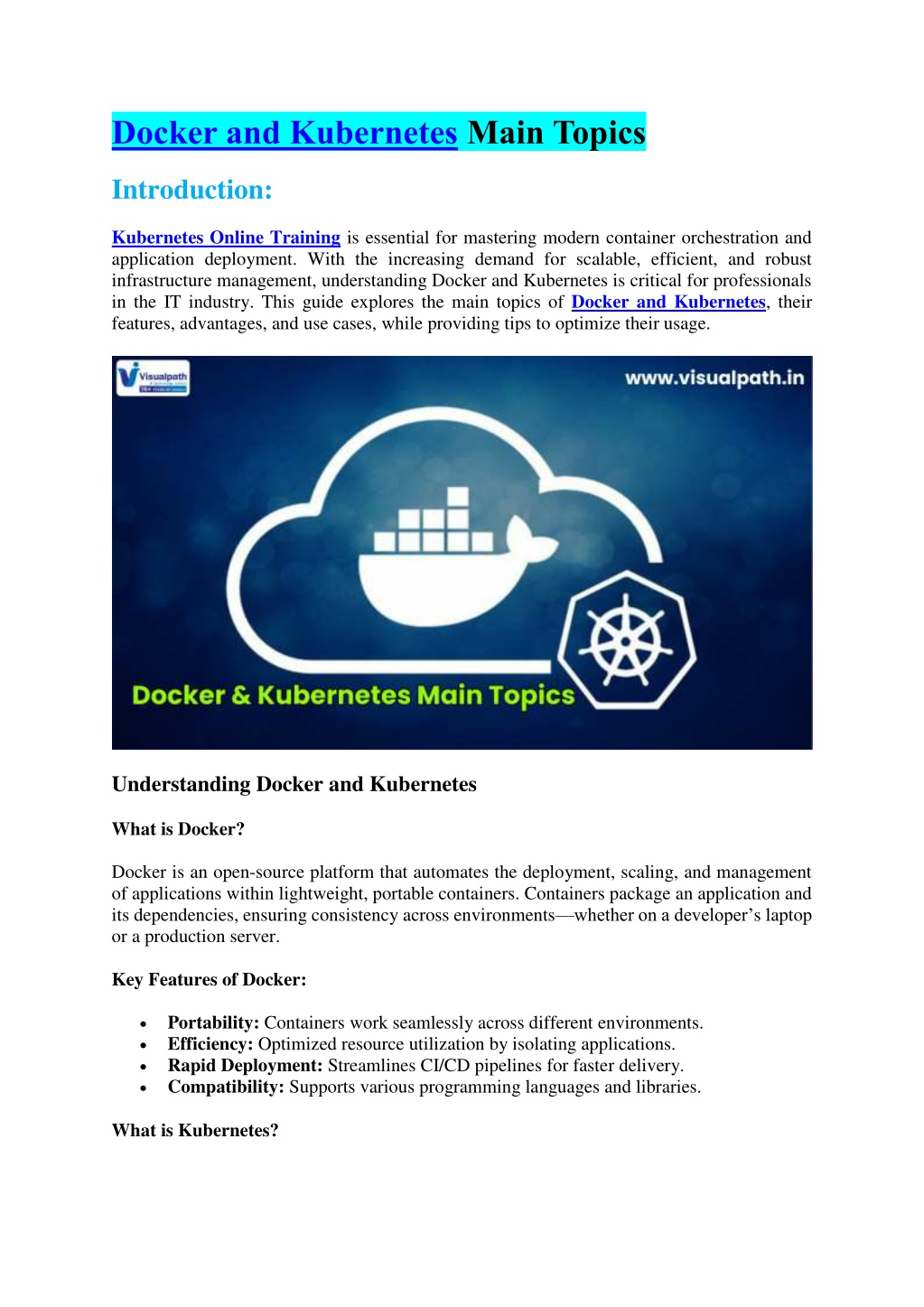
Docker Online Training - Kubernetes Online Training
Visualpath Institute in Hyderabad offers top-notch Kubernetes Online Training and Docker Online Training led by industry experts. Available globally, including the USA, UK, Canada, Dubai, and Australia, the courses focus on hands-on learning. Key top
Uploaded on | 0 Views
Download Presentation

Please find below an Image/Link to download the presentation.
The content on the website is provided AS IS for your information and personal use only. It may not be sold, licensed, or shared on other websites without obtaining consent from the author. Download presentation by click this link. If you encounter any issues during the download, it is possible that the publisher has removed the file from their server.
E N D
Presentation Transcript
Docker and Kubernetes Main Topics Introduction: Kubernetes Online Training is essential for mastering modern container orchestration and application deployment. With the increasing demand for scalable, efficient, and robust infrastructure management, understanding Docker and Kubernetes is critical for professionals in the IT industry. This guide explores the main topics of Docker and Kubernetes, their features, advantages, and use cases, while providing tips to optimize their usage. Understanding Docker and Kubernetes What is Docker? Docker is an open-source platform that automates the deployment, scaling, and management of applications within lightweight, portable containers. Containers package an application and its dependencies, ensuring consistency across environments whether on a developer s laptop or a production server. Key Features of Docker: Portability: Containers work seamlessly across different environments. Efficiency: Optimized resource utilization by isolating applications. Rapid Deployment: Streamlines CI/CD pipelines for faster delivery. Compatibility: Supports various programming languages and libraries. What is Kubernetes?
Kubernetes is an open-source container orchestration platform developed by Google. It automates the deployment, scaling, and management of containerized applications across clusters of machines. Key Features of Kubernetes: Scalability: Dynamically scales applications up or down based on traffic or resource demands. Self-Healing: Automatically restarts failed containers and reschedules workloads. Load Balancing: Distributes network traffic efficiently to ensure application reliability. Declarative Configuration: Simplifies infrastructure management using YAML or JSON files. Docker and Kubernetes: How They Work Together While Docker focuses on containerizing applications, Kubernetes orchestrates and manages these containers across clusters. Using them together provides: Comprehensive Infrastructure: Docker handles the "packaging," while Kubernetes manages deployment and scaling. Flexibility: Supports hybrid and multi-cloud environments. Improved Resource Management: Ensures efficient use of computational resources. For hands-on expertise, enrolling in a Docker and Kubernetes Course is highly recommended. Such training provides practical knowledge and real-world scenarios to master these technologies. Main Topics of Docker and Kubernetes 1. Containerization Basics Understand the fundamentals of containers, their structure, and how Docker simplifies the process of creating, deploying, and running containers. 2. Docker Components Docker Engine: The runtime that builds and runs containers. Docker Images: Pre-configured templates for creating containers. Docker Hub: A cloud-based registry for sharing container images. 3. Kubernetes Architecture Master Node: Manages the cluster and schedules tasks. Worker Nodes: Execute workloads and run containers. Etcd: A distributed key-value store for configuration data. Kubelet: An agent that ensures containers are running as specified. 4. Networking in Docker and Kubernetes
Both technologies rely on networking to enable communication between containers, services, and external users. Kubernetes enhances this with advanced features like service discovery and DNS resolution. 5. Scaling and Load Balancing Learn how Docker simplifies horizontal scaling and how Kubernetes automates it to maintain application performance. Advantages of Docker and Kubernetes Advantages of Docker: 1.Consistency Across Environments: Ensures applications behave the same in development and production. 2.Efficient Resource Usage: Lightweight compared to virtual machines. 3.Speed: Rapid boot times and deployment. Advantages of Kubernetes: 1.Resilience: Automatic failover and recovery mechanisms. 2.Automation: Simplifies tasks like deployment, scaling, and updates. 3.Open Ecosystem: Integrates with a wide array of tools and platforms. Tips for Optimizing Docker and Kubernetes Usage 1. Understand Application Requirements Ensure your containers have all the necessary dependencies and that your Kubernetes clusters are sized appropriately for expected workloads. 2. Use Multi-Stage Builds Leverage Docker s multi-stage builds to optimize image sizes, reducing deployment times and resource usage. 3. Monitor Your Cluster Implement monitoring tools like Prometheus and Grafana to gain insights into container performance and cluster health. 4. Leverage CI/CD Pipelines Integrate Docker and Kubernetes into CI/CD pipelines for automated testing, building, and deployment. 5. Prioritize Security Use trusted images from Docker Hub or private registries.
Implement Role-Based Access Control (RBAC) in Kubernetes. Use Cases of Docker and Kubernetes 1. Micro services Architecture Docker and Kubernetes simplify the development and management of micro services, enabling faster scaling and independent deployments. 2. Hybrid Cloud Deployments Kubernetes excels in managing workloads across on-premises and cloud environments, ensuring seamless scalability and availability. 3. Continuous Integration and Delivery (CI/CD) These tools streamline CI/CD pipelines, enabling faster delivery cycles with minimal downtime. 4. Edge Computing Kubernetes supports edge computing by managing distributed containers efficiently across remote locations. Conclusion Mastering Docker and Kubernetes is a necessity for modern IT professionals aiming to build robust, scalable, and efficient systems. By understanding their features, advantages, and real- world applications, you can unlock new possibilities for application development and deployment. Whether you re just starting or looking to enhance your skills, enrolling in a Kubernetes Online Training program or a Docker and Kubernetes Course is a great step forward. These training programs, coupled with practical experience, ensure you stay ahead in the rapidly evolving tech landscape. Visualpath is the Best Software Online Training Institute in Hyderabad. Avail complete Docker and Kubernetes worldwide. You will get the best course at an affordable cost. Attend Free Demo Call on - +91-9989971070. WhatsApp: https://www.whatsapp.com/catalog/919989971070/ Visit: https://www.visualpath.in/online-docker-and-kubernetes-training.html

